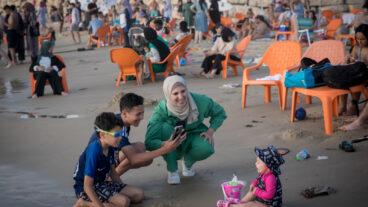Quantum physics professor Ron Folman hopes to bring the high-tech industry to Israel’s neglected south, using the expertise of Ben Gurion University as the drawRon Folman has spent a considerable part of his 45 years breaking barriers. As an Israel Air Force pilot it was the sound barrier, then educational barriers for himself and for young people from the neglected Negev town of Yeroham, and then emotional barriers between Israelis and Germans.
Now a professor at Ben-Gurion University in Beersheba, he is trying to tear down the invisible wall that restricts scientific research, and the high tech industry that goes with it, to a limited geographical area in the center of the country.
Folman has made several other stops along the way to becoming an internationally known physicist who has taught at prestigious scientific institutions in Europe and the Americas and head of BGU’s Atom Chip Group. Those side trips include stints as an avid hiker and desert-lover, a lecturer in the philosophy of creativity at the Jerusalem-based Bezalel Academy of Art and Design, Israel’s leading art school, and a social activist who served as head of the Israeli branch of Amnesty International.
But though he still leaves time for other interests, his main focus now is building what he calls the Nano-Bio-Quantum Valley, an envelope of high tech industry around BGU’s expertise in the related, futuristic disciplines of nanoscience, bioscience and his own specialty, quantum physics.
“The only way to develop the Negev is to bring high tech jobs,” he told ISRAEL21c. “And high tech jobs means high tech industry, which will not come because of some tax breaks the government may hand out, it will come because they can make a lot of money. This is the model in California, of Stanford with the Silicon Valley.”
The difference, he adds, is that Silicon Valley is 20th century technology, while the clean rooms of the BGU facility provide resources for the technologies of the 21st.
It’s a task he took on four years ago. After a spell at Heidelberg University (where German students couldn’t help but notice that the young Israeli had his father’s concentration camp number tattooed on his arm), he was due to join another Israeli university when then-BGU president Avishay Braverman, today a Labor Knesset member, called with an offer Folman couldn’t refuse: “to build the infrastructure so technology companies won’t need so much investment because they can outsource to the university, and rely on patents developed there.”
At that point, with his academic career at fast-forward, it was a now-or-never-decision.
“I gave myself 10 years to complete the project, I always give myself a deadline. And now I have six years left, to see high tech industry here,” he says, rapping on the table to add emphasis. “We already have contracts from Israeli industry, and for the first time a $7.5 million grant from the government of Israel. Till now, they have always given the nano-related research money to the Technion and the Weizmann Institute, but now we are being noticed as well.”
In addition, there’s a first-time grant from the EU, to have Europeans train in the three disciplines at BGU. It’s all happening because BGU has turned its lack of long years of cutting-edge infrastructure into an advantage, by incorporating scientific concepts that originated in the last few years into its infrastructure. The nano-bio-quantum program – and the new building that houses it on the edge of the Beersheba campus, across from the site designated for a high-tech park and the brand-new railroad line to Tel Aviv – “were built for the future,” he says.
The three areas of scientific inquiry constitute the building blocks of technologies of the future, Folman contends. Nanoscience, which deals with single atoms or single molecules, may hold the key to new materials much stronger and versatile than anything known today. But there are many questions still to be answered about them, he explains.
“How do you interface with them, mechanically or with electricity or light? For new devices to work, there will have to be interfaces between our large-scale world and these tiny molecules.”
Using nanoscience it may be possible to produce new nanomembrane filters that will make desalinating water much more cheaply, and electricity -producing solar panels from nanomaterials. Nanomaterials will affect every area of our life, from electronics to the aerospace industry to clothing and cleaning the environment.
In a little more than a nanosecond, he’s talking about the atom chip and his own specialty. Quantum physics deals with small particles like electrons, protons and neutron, which can interact and behave very differently from larger objects.
“Quantum turns old assumptions about physics on their head, because it says that the same object can be in two places at the same time. Not move between them very fast, but be there. Which is the reason, for example, that computers on a single atom can be so fast, because impulses don’t have to move between them,” he says. Using quantum technology it will be possible to “measure time more accurately than any clock we have, compute faster than any computer we have. Extremely accurate quantum sensors will be able to the globe and tell us about minerals, water, oil and underground bunkers and tunnels, a very popular topic these days. And we can create with them communications systems that are completely secure, this is important not only for security but for the financial system as well,” he says.
In the same context tiny biochips, in effect ultra-miniature labs able to test hundreds or thousands of biological reactions at one time, offer new horizons for medical diagnostics. “A single biochip could have 1,000 labs on it, to analyze a drop of blood or urine more accurately than anything that we have now,” he says. Similarly, researchers are working on tiny capsules that can improve drug delivery, homing in on and penetrating cancer cells, for example, before releasing their potent drugs.
The path to world-class science and a dream of making the desert bloom economically started during his childhood in Rehovot.
“We lived just behind the fence at the Weizmann Institute of Science, and from a very young age the Weizmann labs were my playground. When the scientists went home, we (youngsters) went in. The scientists weren’t aware that there were two shifts, but we had them,” he chuckles.
Science came naturally to young Folman, whose Holocaust-survivor father was a researcher at the Rehovot-based Hebrew University Faculty of Agriculture, and later the Agriculture Ministry’s chief scientist. So did hard work.
“My father was one of the youngest survivors of Auschwitz, who came to Israel a virtual illiterate, worked in a factory in Tel Aviv, making ammunition, and did his high school during the night, where he met my mother, another survivor of the war who had come here on the Exodus, the famous refugee ship. And from being illiterate he made it to be a professor of biology.”
His father’s career took the family abroad, and young Ron lived for a few years in Australia, the UK, and Los Angeles. But there was also time, back home, to discover the desert.
“For my bar mitzva, my parents sent me on a two-week camel safari. I simply loved it,” he says. And from then on, he came back to the desert – and the Red Sea on which it borders – “almost every year, for diving and for hiking. And I came back again as a soldier, at the Hatzerim air base near Beersheba.”
Folman quickly discovered that despite all the excitement and glamour, the pilot’s life was not for him.
“I had a huge hunger for study. I thought that flying would be good enough to fill my curiosity bank, but very quickly at the end of my pilot’s course I felt very strongly that I needed to continue my studies,” he says.
So even when he was flying by day, he began studying at night, in his bed at the air force base, for a first degree from Israel’s Open University.
“At that time, the Open University was thought to be exclusively for people who didn’t want an academic career, people who had not passed their high school matriculation exams, housewives and pensioners. But I wanted to go further than that.”
After his discharge from the Air Force, Folman broke another barrier, becoming possible the first graduate of the Open University to be accepted in a master’s program at the prestigious Weizmann Institute. “They had a hard time accepting me, because I came from the Open University and because I came out of the desert,” he says.
But before resuming his studies he took another step. Instead of a post-army adventure trip to South America or the Far East taken by so many young Israelis these days, he had opted to take a year off teaching science in Yeroham, a small development town in the middle of the desert.
“I chose the place which at that time was the symbol of bad education, of poverty, hopelessness, and tried to something special there,” he says.
At the end of his year there, Folman made what he calls “a Santa Claus promise – I told them that one day, if they have a good dream, I will help make it a reality.”
For a decade no one from Yeroham took Folman, who in the meantime had become a physicist, up on the promise. “But one day I got a phone call from a girl in that class, who said the sentence I wanted to hear: ‘I have a dream.'”
Her dream was to become the first architect from Yeroham. But though no Israeli school of architecture was willing to accept her, Folman and some private donors put together a package that allowed her to attend the prestigious Pratt Institute in New York.
“People told me that a girl from Yeroham with no experience abroad would not survive in New York, even if she was a pretty good architect. She surprised everyone, and became a New Yorker in no time. And now she’s designing buildings in New York and London, and her husband, another Israeli who she met there, did a PhD in economics at Columbia.” The couple is due back in Israel, “possibly in a year or two, and she promised to start building beautiful buildings in the Negev.”
Folman, who’s broken down a lot of barriers, also seeks to build something beautiful in the Negev.![]()












